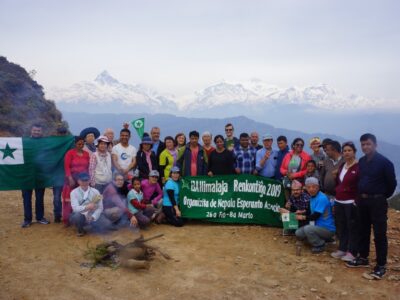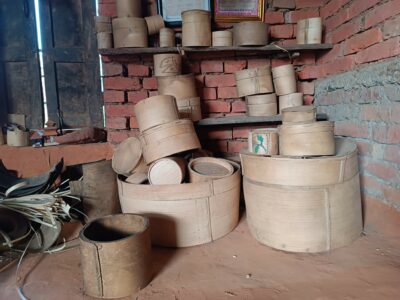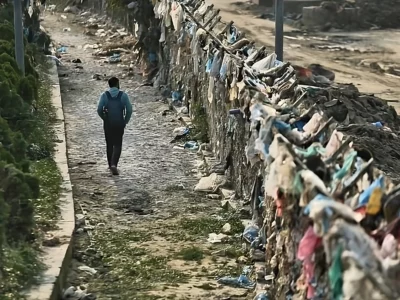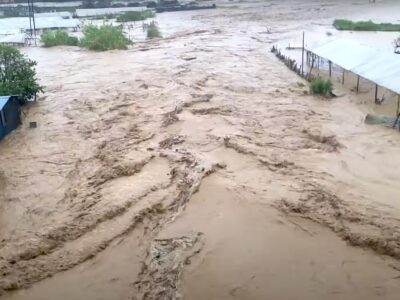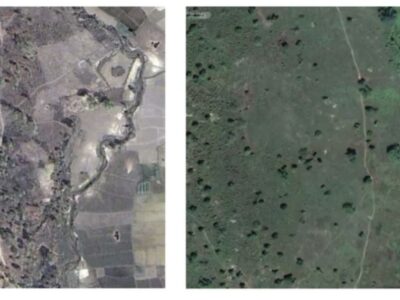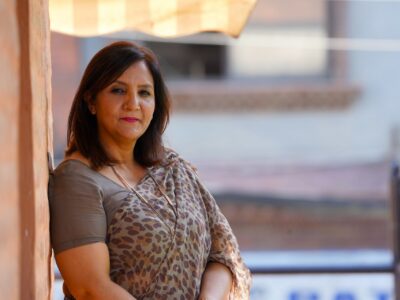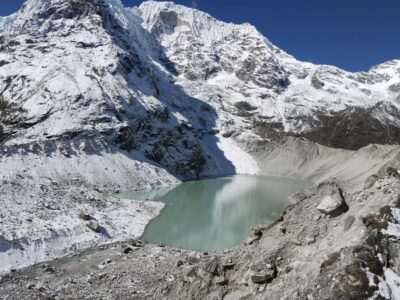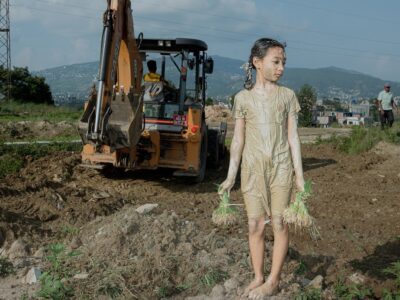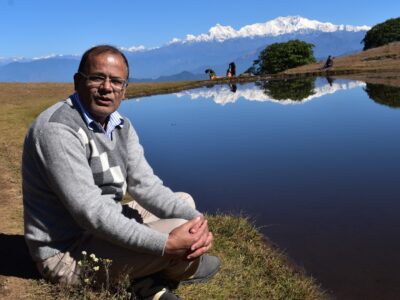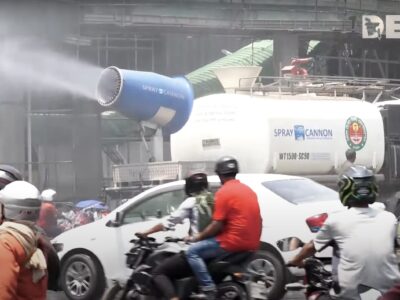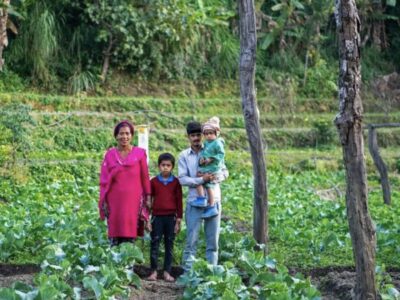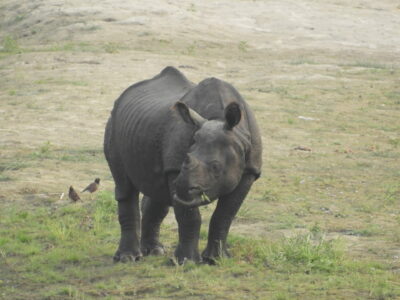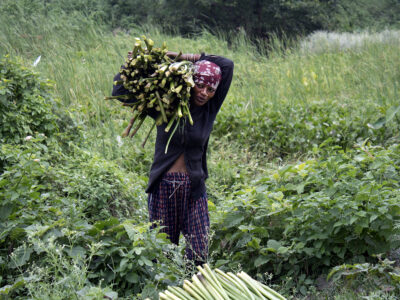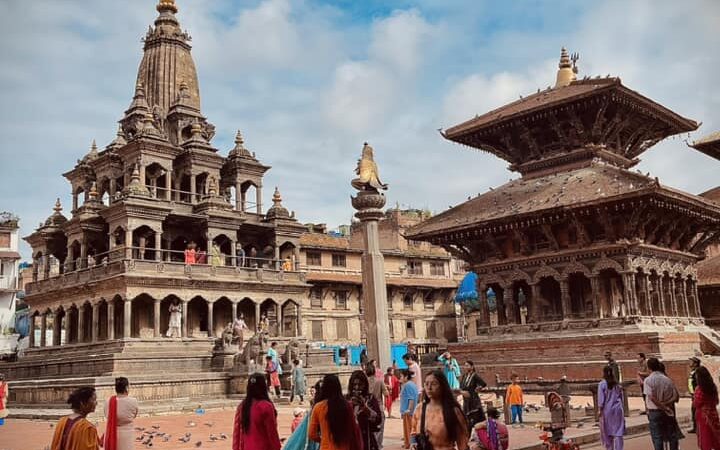
Patan Square. One of the iconic historical sites in Kathmandu, Nepal. Photo courtesy of Filip Noubel, used with permission.
Nepal, sitting in the heart of the Himalayan mountain range, has historically been a key crossroads between South, West, and East Asia. This constant churn of diverse cultures and traders has made Nepal into a melting pot of religions, traditions, and culture.
The Nepali government has invested significant resources in documenting and preserving this unique history, which can be seen at UNESCO World Heritage sites such as Durbar, Patan and Bhaktapur squares.
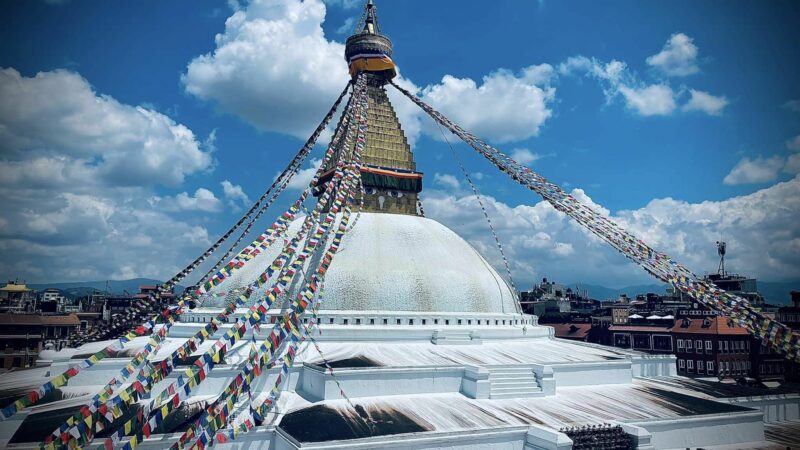
A Buddha Stupa. Another iconic site in Kathmandu. Photo courtesy of Filip Noubel. Used with Permission.
But Nepal isn’t only interested in preserving the past, its environmental policies are some of the most forward thinking and cutting edge in the world. Because of Nepal’s geography, much of the population lives in the flatlands at the base of the Himalayan mountains, making it especially vulnerable to climate disasters including flooding, glacial lake outbursts, heatwaves, pastoral droughts, and landslides. Therefore, the Nepali government has made climate action a top priority to protect its population and the over 446 endemic plant and animal species that can be found there.
As the world grapples with the climate crisis and most countries continue propagating lackluster climate policies, Nepal should stand as a model for world leaders. One example is its impressive forest restoration efforts, wherein it has doubled the forest cover in its Terai region over the last 25 years. It’s also heavily investing in promoting sustainable agricultural practices in its sizable farming communities.
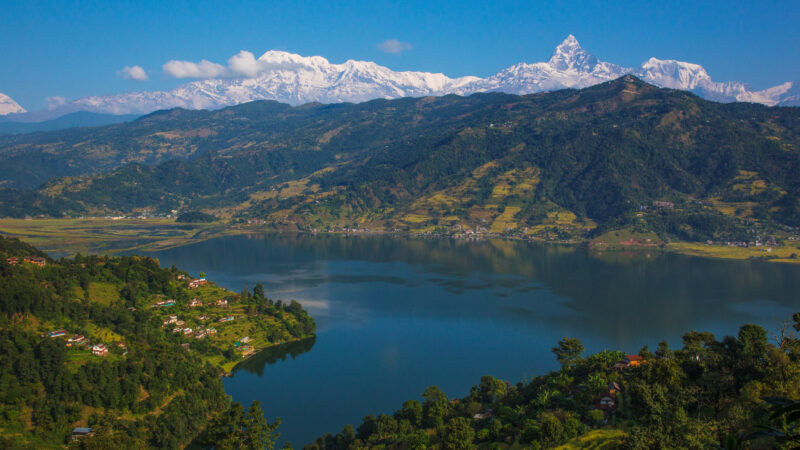
Phewa lake in Pokhara, Nepal. Image from Wikimedia Commons. License CC BY-SA 3.0
Nepal is also home to 63 Indigenous groups and has 124 spoken languages. Indigenous leaders have praised the Nepali government for balancing Indigenous rights with its environmental conservation efforts, successfully working with Indigenous leaders to create policies that respect Indigenous traditions while protecting the environment.
Even so, some communities in Nepal — particularly dalit groups — continue to be marginalized and face added social and economic challenges and barriers in society.
In December 2024, Global Voices will meet in Kathmandu, Nepal for two days of connection, collaboration and conversation with journalists, activists, technologists, and others from around the world. Ahead of this event, we will use this special coverage to explore the complex dynamics of this often underrepresented country, delving into Nepal’s environmental success stories; celebrating its traditions, food, and languages; while acknowledging the existing social and political challenges.
Stories about The melting pot of Nepal
The Journey of the Esperanto Movement in Nepal over the past eight decades
Sanjib Chaudhary from Global Voices spoke with Bharat Kumar Ghimire, President of the Nepalese Esperanto Association to learn about the Esperanto movement in Nepal.
In a Nepali village, residents struggle to reconcile traditional artisanship with modernization
Nepal's Pyangaon village, named after “pyang” — traditional Nepali measuring containers made from bamboo — is at a crossroads of whether to continue its artisan traditions or modernizing their products and processes.
Scores of Nepalis tricked into joining the Russian army
A Nepali cook falsely recruited in the Russian Army started seeking a way to escape when he saw his name on a roster of soldiers being sent to the frontlines.
Nepali Nobel Prize nominee Surya Subedi on law, human rights, and global peace
Global Voices interviewed British-Nepali Professor Surya Subedi, a scholar and peace expert, via email to gain his perspectives on the evolving role of international law in promoting peace and justice.
Kathmandu's floods expose a deepening garbage crisis
The recent Kathmandu floods swept the city's garbage — cloth, Styrofoam, plastic bottles — across ruined pavements and embankments, raising serious concerns about the growing garbage crisis in the capital.
Announcing the Global Voices Summit 2024: Join us in Kathmandu, Nepal on Dec. 6-7!
We’ll convene journalists, activists, technologists, and others from around the world to discuss digital media, knowledge and activism from a Global Majority perspective.
Nepal floods: Festival joy turns to devastation amid unprecedented tragedy
Ahead of Nepal's Dashain festival on October 3, devastating floods and landslides in late September resulted in at least 219 fatalities, transforming the celebrations into a profound national tragedy.
Mapping the shrinking forests in the Terai region of Nepal
Nepal’s forest cover has doubled in 25 years, but illegal logging is thinning the southern jungles.
Shaping Nepal's reading culture: An interview with Saguna Shah, founder of bOOkahOlics
Global Voices interviewed Saguna Shah, founder of bOOkahOlics, Nepal’s largest online book club, to explore her impact on transforming Nepal’s reading culture and connecting Nepali readers.
Making documentaries for select audiences: Interview with Nepali filmmaker Rajan Kathet
To understand the challenges and joys of documentary filmmaking — a rare profession in Nepal — Global Voices spoke to Rajan Kathet, a Kathmandu-based filmmaker.
Lives on the line in the Himalayan mountains
Glacial lake outbursts and debris flows will be more destructive and frequent in Nepal in the near future, highlighting the amplified risks of mountain living due to climate change.
Uniting Nepali voices and cultures through journalism: An interview with Nabin Pokharel
Global Voices interviewed award-winning Nepali diaspora journalist Nabin Pokharel to explore his dedication to uniting Nepalis worldwide by amplifying diverse voices and stories, while promoting their language and culture.
In Nepal, when yaks go, so does culture
Yaks, once central to the culture of Himalayan communities in Nepal, are declining because of lifestyle changes, outmigration, inbreeding, and the impacts of the climate crisis.
Pouring concrete on rice fields in Nepal
Delayed rains, a prolonged heatwave, rapid urbanization, and climate change have hampered Nepal's rice plantation industry, transforming the country from a rice exporter to an importer.
A highly invasive South American catfish has slipped into Nepal’s waters
A highly invasive vermiculated sailfin catfish, originally from Madeira River Basin in South America, is poised to be a major threat to native fish in the rivers of Eastern Nepal.
Unearthing Nepal's Past: An Interview with Journalist and Author Mohan Mainali
Global Voices interviewed journalist and writer Mohan Mainali to explore the importance of historical context in shaping Nepal’s future and inspire a deeper appreciation for the nation’s rich heritage.
One in five Nepalese youths in Hong Kong are returned to Nepal against their will
Family problems and financial difficulties are the main reasons Nepali parents to send their children back to Nepal.
South Asia sizzles: Record heatwave and extreme weather blamed on climate crisis
A scorching heatwave is ravaging South Asia, impacting the lives of hundreds of millions. Schools have been forced to close and the risk of health hazards has risen dramatically.
In Nepal, families that farm together stay together
The UN designated 2019–2028 as the "Decade of Family Farming". Some Nepali households are embracing sustainable agriculture to address climate change and enhance income.
Balancing Indigenous rights and nature conservation in Nepal
The publication of Nepal's policy on “Construction of Physical Infrastructure Inside Protected Areas” has ignited a lot of controversy for its potential to displace Indigenous communities from their ancestral lands.
Solving the invasive aquatic weeds problem in Nepal
Water hyacinth, an invasive Amazonian species, clogs Nepal's waterways, suffocating native flora and blocking essential nutrients for aquatic life. A Nepali handicraft collective creatively repurposes its fibre for household items.

